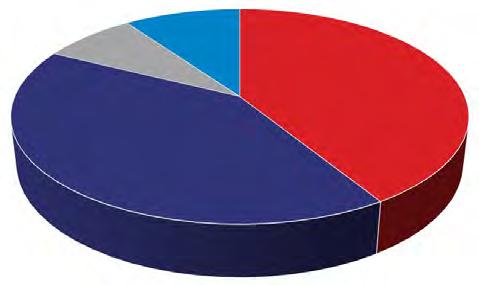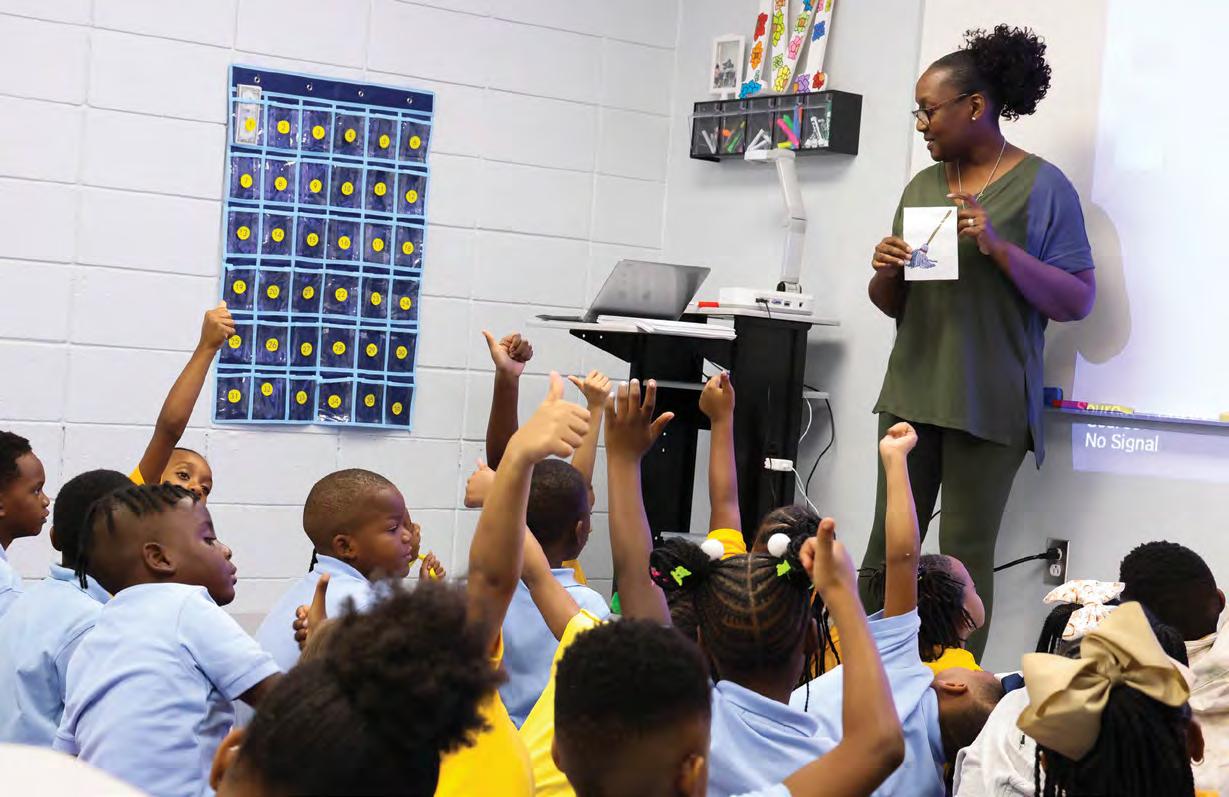Focus Group Themes
This section gives an overview of the topics that were covered and themes that emerged during the focus groups.
We indicate the school or schools where each theme was discussed in parentheses. Note that themes with the RePublic Schools designation could be referring to any of the four Mississippi schools in the charter network.
As a caveat, the information in this section reflects only the views and opinions of focus group participants. It is not necessarily representative of the majority of parents at each school.
Where relevant, we describe similarities and differences between findings from the focus groups and findings from our 2023 telephone survey with parents and guardians in charter school communities. In describing findings from the 2023 survey, we refer to parents and guardians of students who are enrolled in charter schools as “charter parents,” and parents of guardians of students who are enrolled in traditional public schools (but live in communities with charter schools) as “non-charter parents.” Two schools included in the focus group data, Instant Impact and SR1, were not yet open during the administration of the 2023 survey, so we do not include comparisons for focus group findings that only pertained to these schools.
Motivation for Charter School Enrollment
Facilitators asked participants to share the reasons they chose to enroll their child in a charter school. Several key themes emerged:
Dissatisfaction with Traditional Public Schools: Many participants chose a charter school because they were unhappy with their child’s previous school experience, citing concerns about academics, discipline, or school culture (Ambition Prep, Instant Impact, RePublic Schools, Leflore Legacy).
Smaller Class Sizes and Personalized Learning: Some participants were drawn to charter schools for their smaller class sizes and more individualized attention compared to traditional public schools (Ambition Prep, Instant Impact, SR1).
Positive Word of Mouth: A few participants enrolled their child after hearing positive experiences from family members (RePublic Schools) or because their child’s friends were attending (Leflore Legacy).
Comparison to Telephone Survey: The 2023 survey found that friends and family were among the most common sources of information about charter schools for non-charter parents and charter parents.
Strong Academic Focus: Some participants specifically sought out charter schools for their academic rigor and innovative instructional approach (SR1, Instant Impact).
Perceptions of Charter Schools
Facilitators asked about participants’ knowledge and perception of charter schools before and after enrolling their child in a charter school. Participants reported changes in their beliefs about charter schools:
Improved Perception: Focus group participants tended to have a limited or negative perception of charter schools before having direct experience with one, but their perception improved after their child attended the school (Ambition Prep, Clarksdale Collegiate, RePublic Schools).
Comparison to Telephone Survey: The 2023 survey found that non-charter parents had limited knowledge about charter schools, with only 22.3% reporting that they were “very familiar” with charter schools. In contrast, 73.3% of charter parents reported high familiarity.
Increased Awareness: Participants initially believed that charter schools were very strict or that they were only for “super smart kids” and would not accommodate other students’ special needs; after enrolling their children, they found this not to be the case (Instant Impact).
Impression of Cost: Several participants believed that charter schools charge tuition and were relieved to find that they were free to attend (Instant Impact).
School Leadership
Facilitators asked participants if they were satisfied with the school leaders at their charter school. In general, participants had positive comments about school leaders:
S atisfaction with Leaders’ Visions: Participants from most schools were satisfied with their school’s leadership and the vision of their school leaders (Ambition Prep, Clarksdale Collegiate, Instant Impact). Participants noted positive interactions with their school leaders (Leflore Legacy, Instant Impact).
Participants from two schools provided mixed feedback:
Lack of Follow Through and Communication at SR1: Participants from SR1 indicated that they were satisfied with their school leaders, but they felt that the leaders sometimes made promises that they did not fulfill. They also described a need for better communication from school leaders.
Dissatisfaction with Leaders’ Visions at RePublic: Participants from RePublic Schools had negative feedback about their school leadership (note that RePublic has four Mississippi schools in its system; it was unclear in the transcripts to which schools this negative feedback was referring). They described how they are dissatisfied with their school leaders’ visions and communications.
Curriculum and Instruction
Facilitators asked participants about their satisfaction with the curriculum and instruction at their child’s charter school compared to their previous school experience. Most participants expressed overall satisfaction with the quality of instruction, highlighting the following positive aspects:
Innovative Teaching Approaches: Participants felt their schools used engaging and effective instructional methods (Ambition Prep, SR1, Instant Impact, RePublic Schools, Leflore Legacy).
Personalized Learning: Participants noted that small class sizes helped create a more individualized learning experience for students (Ambition Prep, Instant Impact, SR1, Leflore Legacy).
Comparison to Telephone Survey: While the majority (83.7%) of charter parents in the 2023 survey responded that their child’s school provides individualized instruction, this statement had the lowest agreement of all the statements in the survey related to schools’ educational programs.
Balanced Assessment Approach: Participants appreciated that their school did not place excessive emphasis on standardized testing (Leflore Legacy).
Academic Growth: Participants observed improvements in their child’s reading skills (Instant Impact) and writing skills (Leflore Legacy) since enrolling in a charter school.
Comparison to Telephone Survey: In the 2023 survey, a high percentage of parents (94.3%) agreed that their childrens’ charter schools were good at teaching basic academic skills, such as reading.
While satisfaction with curriculum and instruction was high, some parents noted areas for improvement:
Homework: Participants felt that homework was excessive (Clarksdale Collegiate), too difficult (Instant Impact), or unclear and repetitive (RePublic Schools).
Comparison to Telephone Survey: The majority of parents (86.9%) in the 2023 survey agreed that their students’ classwork and homework assignments were meaningful. However, there was a drop in agreement with this statement compared to survey data from 2020, in which 94.8% of parents indicated agreement with the statement.
Advanced Learning Opportunities: Participants wanted more opportunities to challenge high-achieving students (Clarksdale Collegiate).
Communication and Feedback: Participants requested more frequent parent-teacher conferences (Instant Impact) and clearer feedback from teachers (RePublic Schools).
Teachers
Facilitators asked if participants were satisfied with the quality of instruction, classroom management, and communication from their child’s teachers. Participants from most schools were highly satisfied with the teachers at their school.
Accessibility to Teachers: Participants from most schools reported that the teachers were very accessible and communicative about their students’ progress, and they contrasted this with a lack of communication at traditional public schools (Leflore Legacy, Clarksdale Collegiate, SR1).
Use of Technology: Participants appreciated being able to access information on the school’s website about the school’s curriculum (Ambition Prep) and appreciated the use of technology to enhance communication (Instant Impact).
Dedic ation of Teachers: Participants noted that teachers were dedicated and engaging (Ambition Prep, Clarksdale Collegiate, Instant Impact, RePublic Schools). They appreciated teachers’ willingness to provide support (Leflore Legacy). A participant described how teachers were stern but fair, which fostered a “good learning environment” (SR1).
However, the level of satisfaction with teachers among participants from RePublic Schools varied:
Communication and Teacher Quality: Some participants from RePublic Schools felt that teachers at their school were communicative, while others noted issues with timely communication. Similarly, some participants from RePublic Schools noted that teachers were engaging and passionate while others described concerns about favoritism and arrogance among teachers.
School Culture and Operations
Facilitators asked about participants’ satisfaction with school cultures and environments, including school offices, discipline policies, and school communities. Feedback was generally positive:
Strong Sense of Community: Participants noted a strong sense of community and support at their charter schools (Ambition Prep, Clarksdale Collegiate, Instant Impact, RePublic Schools, SR1). They described how the schools made an effort to engage families (SR1, Clarksdale Collegiate, Instant Impact).
Comparison to Telephone Survey: Results from the 2023 survey corroborate that charter schools are good at engaging parents, with 93% of charter parents agreeing that they “feel welcome” at their child’s school and 93.9% agreeing that they “have opportunities for involvement” at the school.
Strong Communication: Participants appreciated the high level of communication from staff at the charter schools (Clarksdale Collegiate, Instant Impact, Leflore Legacy, RePublic Schools, SR1). One parent noted how the availability of translators for Spanish speakers improved communication and support for parents (SR1).
Efficient Offices: Participants at most schools said that the school offices were efficient and easy to work with (Instant Impact, Clarksdale Collegiate, Ambition Prep, Leflore Legacy, SR1).
Comparison to Telephone Survey: In the 2023 survey, a majority (88.5%) of charter parents agreed that the office at their child’s school was run well.
S atisfaction with Discipline Policies: Participants were generally satisfied with discipline policies across schools, noting that schools were effective in handling discipline (Ambition Prep, Instant Impact, SR1).
S afe Facilities: Participants felt that their charter schools had safe, clean facilities (Ambition Prep, RePublic Schools, SR1, Clarksdale Collegiate).
Comparison to Telephone Survey: In the 2023 survey, a strong majority (96.7%) of charter parents agreed that their child’s charter school had clean and well-maintained facilities.
Positive Environments: Participants felt that the school environments were positive and supported quality learning (Ambition Prep, Clarksdale Collegiate, Instant Impact).
Comparison to Telephone Survey: In the 2023 survey, the majority (91.4%) of charter parents agreed that their child’s charter school “is a good place to learn.” However, this was a drop from an agreement rate of 99.1% in the 2020 survey.
Despite most feedback being positive, there were several concerns brought up regarding school facilities and operations:
Inconsistent Discipline: Some participants felt that discipline was inconsistent between teachers (Ambition Prep, SR1, RePublic Schools).
Need for Facility Improvements: Participants from SR1 noted the need for facility improvements to support a growing student body. Participants at Instant Impact noted safety improvements they wanted made at the school, including more cameras and better door security.
Impac t of School Administration on Environment: Participants from RePublic Schools described how school administration has created a negative school environment, impacting teacher behavior. They characterized their child’s school environment as lacking respect. Moreover, they noted issues with communication from the school office and a lack of responsiveness to parent concerns. Participants from RePublic also described how they felt their child’s school placed more importance on student attendance than student wellbeing; one parent described an instance of their child’s medical documentation being ignored.
Social-Emotional Support
Facilitators asked if the school honored the cultures and identities of its students. Participants indicated that schools were strong in this area:
Respect for Students’ Identities: Participants felt that their charter schools respected their students’ identities and interests (Ambition Prep, Clarksdale Collegiate, Instant Impact, Leflore Legacy, SR1).
Strong Social Emotional Support: Participants felt that the schools provided social-emotional support to students (Ambition Prep, Clarksdale Collegiate, RePublic Schools).
Comparison to Telephone Survey: While the majority (84.7%) of charter parents in the 2023 survey responded that their child’s school provides resources to support students’ emotional wellbeing, this statement had the lowest agreement of all the statements related to school environment.
Improvement in Students’ Development: Participants noted improvements in their childrens’ social and emotional development since enrolling in the charter school, noting that their child has become more vocal (Leflore Legacy), more confident and engaged (SR1), and has “come out of their shell” (Instant Impact).
Special Needs
Facilitators asked participants if their school provided access to resources and experiences that show the teacher and school understand students’ interests or special needs. This appeared to be true at most schools:
Strong Support: Most participants felt that the schools were effective in supporting their childrens’ special needs, such as dyslexia and behavior issues (Ambition Prep, Clarksdale Collegiate, Instant Impact, RePublic Schools).
Comparison to Telephone Survey: In the 2023 survey, 85.9% of charter parents indicated that their child’s school met the needs of students with special needs. Though this is a strong majority of parents, it indicates room for improvement.
Several participants noted areas for schools to focus in serving their students with special needs:
Need for More Dedicated Support: A participant described how their child could benefit from more dedicated support (Instant Impact).
Need for Counselor: A participant described how they were concerned about their school lacking adequate access to a counselor (RePublic Schools).
Plans for the Future
Facilitators asked if participants would continue to send their children to a charter school in later grades (middle school or high school) if they could. Participants expressed a desire for this option.
Desire for Charters Serving Later Grades: Most participants noted that they would choose to continue sending their children to the charter school in middle school (Ambition Prep, Instant Impact, SR1) or high school (Leflore Legacy).
















